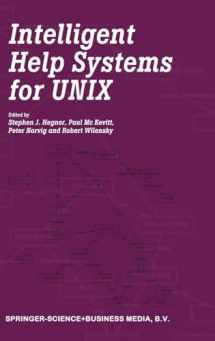
Intelligent Help Systems for UNIX
ISBN-13:
9780792366416
ISBN-10:
0792366417
Edition:
<em>Reprinted from ARTIFICIAL INTELLIGENCE REVIEW, 14:1-5</em>
Author:
Peter Norvig, Paul Mc Kevitt, Robert Wilensky, Stephen J. Hegner
Publication date:
2001
Publisher:
Springer
Format:
Hardcover
424 pages
FREE US shipping
Book details
ISBN-13:
9780792366416
ISBN-10:
0792366417
Edition:
<em>Reprinted from ARTIFICIAL INTELLIGENCE REVIEW, 14:1-5</em>
Author:
Peter Norvig, Paul Mc Kevitt, Robert Wilensky, Stephen J. Hegner
Publication date:
2001
Publisher:
Springer
Format:
Hardcover
424 pages
Summary
Intelligent Help Systems for UNIX (ISBN-13: 9780792366416 and ISBN-10: 0792366417), written by authors
Peter Norvig, Paul Mc Kevitt, Robert Wilensky, Stephen J. Hegner, was published by Springer in 2001.
With an overall rating of 3.5 stars, it's a notable title among other
AI & Machine Learning
(Unix, Operating Systems, User Experience & Usability, Web Development & Design, Psychiatry, Psychology, Schools & Teaching, Computer Science) books. You can easily purchase or rent Intelligent Help Systems for UNIX (Hardcover) from BooksRun,
along with many other new and used
AI & Machine Learning
books
and textbooks.
And, if you're looking to sell your copy, our current buyback offer is $0.3.
Description
In this international collection of papers there is a wealth of knowledge on artificial intelligence (AI) and cognitive science (CS) techniques applied to the problem of providing help systems mainly for the UNIX operating system. The research described here involves the representation of technical computer concepts, but also the representation of how users conceptualise such concepts. The collection looks at computational models and systems such as UC, Yucca, and OSCON programmed in languages such as Lisp, Prolog, OPS-5, and C which have been developed to provide UNIX help. These systems range from being menu-based to ones with natural language interfaces, some providing active help, intervening when they believe the user to have misconceptions, and some based on empirical studies of what users actually do while using UNIX. Further papers investigate planning and knowledge representation where the focus is on discovering what the user wants to do, and figuring out a way to do it, as well as representing the knowledge needed to do so. There is a significant focus on natural language dialogue where consultation systems can become active, incorporating user modfelling, natural language generation and plan recognition, modelling metaphors, and users' mistaken beliefs. Much can be learned from seeing how AI and CS techniques can be investigated in depth while being applied to a real test-bed domain such as help on UNIX.


We would LOVE it if you could help us and other readers by reviewing the book
Book review

Congratulations! We have received your book review.
{user}
{createdAt}
by {truncated_author}


